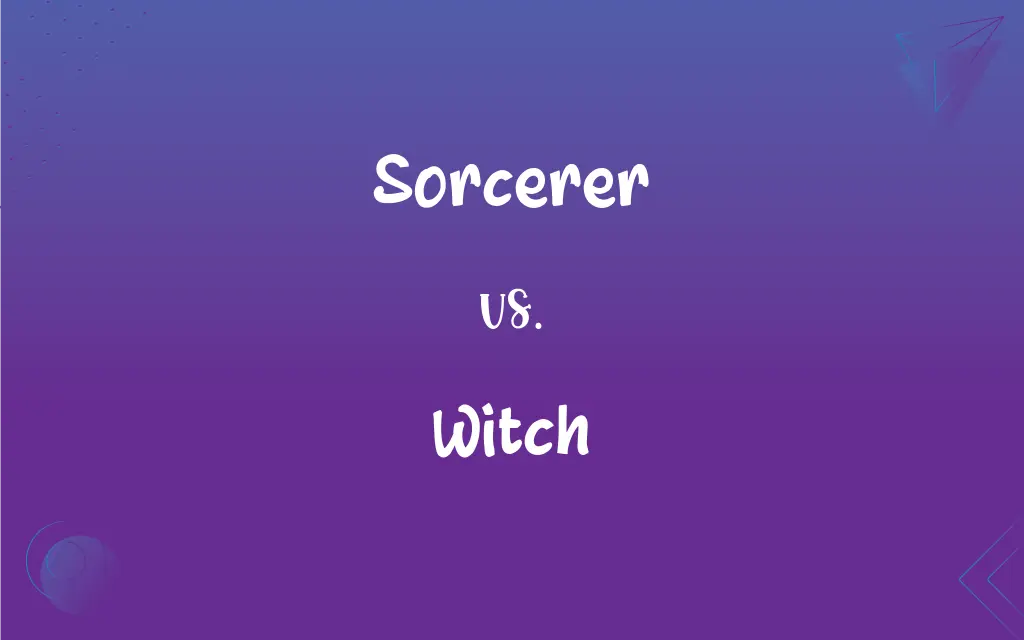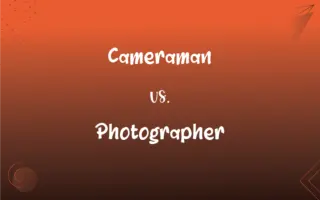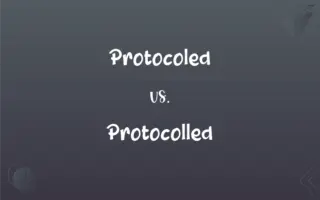Sorcerer vs. Witch: What's the Difference?
Edited by Aimie Carlson || By Janet White || Updated on October 6, 2023

Key Differences
The terms "Sorcerer" and "Witch" both refer to individuals believed to possess magical powers, but they have distinct cultural and historical contexts. Sorcerers are usually seen as individuals, often male, who harness magical energies, sometimes through learned skills or innate power. They might be viewed in some cultures as wise or knowledgeable, wielding their powers with precision. In contrast, a Witch can be either male or female and is frequently linked to earth-based, supernatural, or pagan practices.
While both Sorcerers and Witches can be perceived in various lights, ranging from beneficial to malevolent, Witches historically faced persecution, especially during events like the European witch trials. The term "Witch" might evoke images of a woman with a broomstick or someone casting spells with a cauldron, while "Sorcerer" could bring to mind a more scholarly or arcane figure, possibly wielding a staff or performing intricate rituals.
In literature and folklore, a Sorcerer might be seen as a master of the arcane arts, often requiring rigorous study, whereas a Witch might be portrayed as someone more intuitive, drawing power from nature, deities, or spirits. Yet, both could serve roles as healers, advisers, or protectors in their communities.
Despite their differences, it's essential to understand that the interpretations of these terms are deeply rooted in cultural, historical, and regional beliefs. In some societies, the lines between a Sorcerer and a Witch might blur, with both terms being used interchangeably or with varied nuances.
Comparison Chart
Gender Association
Often associated with males.
Can be either male or female.
ADVERTISEMENT
Origin of Power
Innate power or learned skills.
Earth-based, supernatural, or pagan practices.
Historical Perception
Viewed as wise or knowledgeable.
Often faced persecution; linked to earth or paganism.
Common Imagery
Scholarly figure, possibly with a staff.
Woman with a broomstick or casting spells with a cauldron.
Connection to Nature
Not always directly connected to nature.
Often closely connected to nature and its cycles.
Sorcerer and Witch Definitions
Sorcerer
A person, often male, skilled in the arcane arts.
The Sorcerer spent years studying ancient texts.
ADVERTISEMENT
Witch
A practitioner of magic, sometimes perceived as good or evil.
Tales of a benevolent Witch spread across the region.
Sorcerer
One who wields magic with precision and intent.
The Sorcerer carefully crafted a potion for invisibility.
Witch
A person, especially a woman, claiming or popularly believed to possess magical powers and practice sorcery.
Sorcerer
A practitioner of magic using innate or learned skills.
The Sorcerer cast a spell to protect the village.
Witch
A believer or follower of Wicca; a Wiccan.
Sorcerer
A master of magical rituals and spells.
The Sorcerer chanted incantations to summon a spirit.
Witch
(Offensive) An old woman considered to be ugly or frightening.
Sorcerer
An individual who harnesses magical energies.
The legend speaks of a Sorcerer who could control the elements.
Witch
A woman considered to be spiteful or overbearing.
Sorcerer
One who practices sorcery; a wizard.
Witch
(Informal) A woman or girl considered to be charming or fascinating.
Sorcerer
A magician or wizard, sometimes specifically male.
Witch
One particularly skilled or competent at one's craft
"A witch of a writer, [she] is capable of developing an intensity that verges on ferocity" (Peter S. Prescott).
Sorcerer
A conjurer; an enchanter; a magician.
Pharaoh also called the wise men and the sorcerers.
Witch
To work or cast a spell on; bewitch.
Sorcerer
One who practices magic or sorcery
Witch
To cause, bring, or effect by witchcraft.
Witch
To use a divining rod to find underground water or minerals; dowse.
Witch
A person who practices witchcraft.
Witch
(now usually particularly) A woman who is learned in and actively practices witchcraft.
Witch
An ugly or unpleasant woman.
I hate that old witch.
Witch
One who exercises more-than-common power of attraction; a charming or bewitching person.
Witch
One given to mischief, especially a woman or child.
Witch
(geometry) A certain curve of the third order, described by Maria Agnesi under the name versiera.
Witch
The storm petrel.
Witch
Any of a number of flatfish:
Witch
Glyptocephalus cynoglossus (Torbay sole), found in the North Atlantic.
Witch
Lepidorhombus whiffiagonis (megrim), found in the North Atlantic.
Witch
Arnoglossus scapha, found near New Zealand.
Witch
The Indomalayan butterfly Araotes lapithis, of the family Lycaenidae.
Witch
A cone of paper which is placed in a vessel of lard or other fat and used as a taper.
Witch
(intransitive) To dowse for water.
Witch
To practise witchcraft.
Witch
(transitive) To bewitch.
Witch
A cone of paper which is placed in a vessel of lard or other fat, and used as a taper.
Witch
One who practices the black art, or magic; one regarded as possessing supernatural or magical power by compact with an evil spirit, esp. with the Devil; a sorcerer or sorceress; - now applied chiefly or only to women, but formerly used of men as well.
There was a man in that city whose name was Simon, a witch.
He can not abide the old woman of Brentford; he swears she's a witch.
Witch
An ugly old woman; a hag.
Witch
One who exercises more than common power of attraction; a charming or bewitching person; also, one given to mischief; - said especially of a woman or child.
Witch
A certain curve of the third order, described by Maria Agnesi under the name versiera.
Witch
The stormy petrel.
Witch
A Wiccan; an adherent or practitioner of Wicca, a religion which in different forms may be paganistic and nature-oriented, or ditheistic. The term witch applies to both male and female adherents in this sense.
Witch
To bewitch; to fascinate; to enchant.
[I 'll] witch sweet ladies with my words and looks.
Whether within us or withoutThe spell of this illusion beThat witches us to hear and see.
Witch
A female sorcerer or magician
Witch
A being (usually female) imagined to have special powers derived from the devil
Witch
An ugly evil-looking old woman
Witch
Cast a spell over someone or something; put a hex on someone or something
Witch
A person, male or female, with magical abilities often linked to nature.
The Witch brewed remedies using herbs from the forest.
Witch
An individual associated with earth-based or pagan magical practices.
The village Witch was sought for guidance during the harvest.
Witch
One who draws power from nature, deities, or spirits.
The Witch performed a ritual under the full moon.
Witch
Historically, someone accused of malevolent magic or heresy.
During the trials, many were wrongly accused of being a Witch.
FAQs
Are all Sorcerers male?
No, while Sorcerers are often associated with males, they can be of any gender.
Is a Sorcerer's power always learned?
No, a Sorcerer's power can be either innate or acquired through study.
Were Witches always seen as evil in history?
No, while some Witches faced persecution, many were seen as healers or wise people in their communities.
Can men be called Witches?
Yes, the term "Witch" can refer to both males and females.
Is the portrayal of a Sorcerer with a staff universal?
No, while it's a common imagery, Sorcerers are portrayed in various ways across cultures.
Is the term "Witch" always associated with witchcraft?
Mostly, but "witchcraft" itself has diverse interpretations, ranging from herbalism to spell-casting.
Do Sorcerers always use spells?
Not always, some might use potions, rituals, or other forms of magic.
Can the terms Sorcerer and Witch be used interchangeably?
While they both refer to magical practitioners, they have distinct connotations and are not always interchangeable.
Are all Witches connected to nature?
While many Witches have a strong connection to nature, it's not a universal trait.
Were all accused Witches really practicing magic?
No, many accused Witches in history were innocent and faced accusations due to misunderstandings or malice.
About Author
Written by
Janet WhiteJanet White has been an esteemed writer and blogger for Difference Wiki. Holding a Master's degree in Science and Medical Journalism from the prestigious Boston University, she has consistently demonstrated her expertise and passion for her field. When she's not immersed in her work, Janet relishes her time exercising, delving into a good book, and cherishing moments with friends and family.
Edited by
Aimie CarlsonAimie Carlson, holding a master's degree in English literature, is a fervent English language enthusiast. She lends her writing talents to Difference Wiki, a prominent website that specializes in comparisons, offering readers insightful analyses that both captivate and inform.































































